
Peter W. Heller (born 5 September 1957) is a former deputy mayor of the City of Freiburg im Breisgau in Germany, economist, investor and venture philanthropist.

Peter W. Heller (born 5 September 1957) is a former deputy mayor of the City of Freiburg im Breisgau in Germany, economist, investor and venture philanthropist.
Peter W. Heller was born in Frankfurt am Main, the son of Wolfgang Heller, entrepreneur in the printing industry, and Ingeborg Heller. He studied economics and philosophy at the university of St. Gallen, university of Lausanne (Switzerland) and university of Freiburg (Germany) where he obtained his PhD (Dr. rer.pol.) in 1988 with a thesis on "The Problem of Environmental Degradation in Economic Theory". In 1988, he married Micaela Heller. They have two children, Julia (born 1989) and Jakob (born 1991).
1984 Heller was elected to the City Council of Freiburg and served on the council's committees for the municipal budget, environment, and culture. He left the council in 1990 after his election as deputy mayor.
1990 the council of the City of Freiburg im Breisgau elected him as deputy mayor to head the local administration's environmental protection department, [1] the first of its kind in Southern Germany (until 1996). It comprised the offices of municipal environmental law and regulations, waste management, urban park and forestry services, local energy management and climate policy.
1993 the executive committee of ICLEI – Local Governments for Sustainability elected him as chairman (until 1997). ICLEI is a major global network and agency of local governments committed to environmental protection and local sustainability. [2]
1997 Heller founded the investment company forseo GmbH which holds equity stakes in companies of the solar PV, windpower, and energy efficiency industry. He serves as chairman of the supervisory board of Streb AG (since 2012) and is a member of the board of Fahrenheit GmbH (since 2018). He co-founded solar PV and windpower development companies in Chile, Brazil and France, and provided seed capital for technology developers in the US and Germany.
Heller is the co-founder and executive director of the Canopus Foundation, a private non-profit organisation which became one of the pioneers of Venture Philanthropy in Germany. Since 2000 the foundation has been providing grants and business development assistance to social enterprises active in the field of rural energy access for low income communities in developing countries. In 2008 the Canopus Foundation and Ashoka International, Arlington Va. (US) jointly founded the Solar for All initiative which Canopus coordinated until 2016. [3] [4] Since 2014 the foundation has been promoting organisations in the field of new economic thinking towards more plurality in economic science, and encourages deliberation about the preconditions of a sustainable economy and society.

Freiburg im Breisgau, commonly referred to as Freiburg, is an independent city in Baden-Württemberg, Germany. With a population of about 230,000, Freiburg is the fourth-largest city in Baden-Württemberg after Stuttgart, Mannheim, and Karlsruhe. The Freiburg built-up area had a population of 354,500 (2021). The population of the greater Freiburg metropolitan area ("Einzugsgebiet") was 656,753 in 2018. In the south-west of the country, it straddles the Dreisam river, at the foot of the Schlossberg.

The University of Freiburg, officially the Albert Ludwig University of Freiburg, is a public research university located in Freiburg im Breisgau, Baden-Württemberg, Germany. The university was founded in 1457 by the Habsburg dynasty as the second university in Austrian-Habsburg territory after the University of Vienna. Today, Freiburg is the fifth-oldest university in Germany, with a long tradition of teaching the humanities, social sciences and natural sciences and technology and enjoys a high academic reputation both nationally and internationally. The university is made up of 11 faculties and attracts students from across Germany as well as from over 120 other countries. Foreign students constitute about 18.2% of total student numbers.
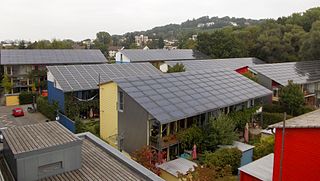
An energy-plus building produces more energy from renewable energy sources, over the course of a year, than it imports from external sources. This is achieved using a combination of microgeneration technology and low-energy building techniques, such as: passive solar building design, insulation and careful site selection and placement. A reduction of modern conveniences can also contribute to energy savings, however many energy-plus houses are almost indistinguishable from a traditional home, preferring instead to use highly energy-efficient appliances, fixtures, etc., throughout the house.

Dieter Salomon is a German politician of Alliance '90/The Greens who served as mayor of Freiburg im Breisgau for two terms from 2002 until 2018.

ICLEI – Local Governments for Sustainability is an international non-governmental organization that promotes sustainable development. ICLEI provides technical consulting to local governments to meet sustainability objectives.

Kerstin Andreae is a German politician of Alliance '90/The Greens who served as Member of the Bundestag from 2002 to 2019. Since leaving politics, she has been serving as managing director of the German Association of Energy and Water Industries (BDEW).
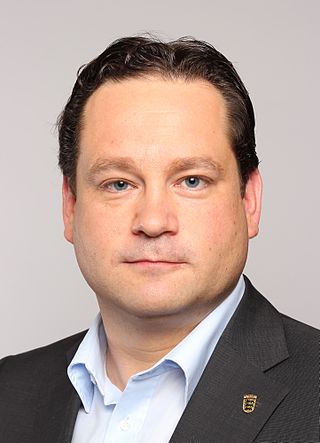
Alexander Bonde is a German politician of Alliance 90/The Greens who has been serving as the secretary-general of the German Federal Environment Foundation (DBU) since 2018.

Rolf Disch is a German architect, solar energy pioneer and environmental activist. Born in Freiburg im Breisgau, Germany, Disch has dedicated particular focus to regional renewable and sustainable energy.
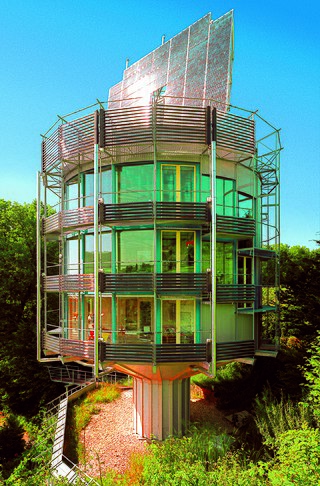
The Heliotrope is a design of environmentally friendly housing by German architect Rolf Disch. Three such buildings exist in Germany; the first experimental version was built in 1994 as the architect's home in Freiburg im Breisgau, while the other two were used as exhibition buildings for the Hansgrohe company in Offenburg and a dentist's lab in Hilpoltstein in Bavaria.

The Solar Settlement at Schlierberg is a 59-home PlusEnergy housing community in Freiburg, Germany. Solar architect Rolf Disch wanted to apply his PlusEnergy concept, created originally with his Heliotrope home, to mass residential production. The residential complex won such awards as House of the Year (2002), Residential PV solar integration award (2002), and "Germany's most beautiful housing community" (2006). It is one of the first housing communities in the world in which all the homes produce a positive energy balance and which is emissions-free and CO2 neutral.
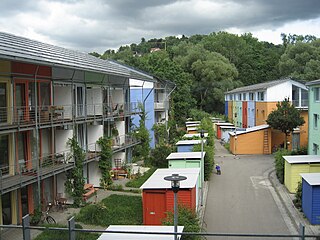
Vauban is a neighbourhood (Stadtteil) to the south of the town centre in Freiburg, Germany. It was built as "a sustainable model district" on the site of a former French military base named after Sébastien Le Prestre de Vauban, the 17th century French Marshal who built fortifications in Freiburg while the region was under French rule. Construction began in 1998, and the first two residents arrived in 2001.
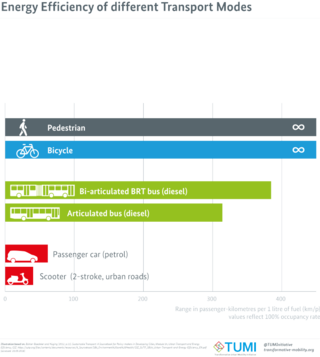
Sustainable urbanism is both the study of cities and the practices to build them (urbanism), that focuses on promoting their long term viability by reducing consumption, waste and harmful impacts on people and place while enhancing the overall well-being of both people and place. Well-being includes the physical, ecological, economic, social, health and equity factors, among others, that comprise cities and their populations. In the context of contemporary urbanism, the term cities refers to several scales of human settlements from towns to cities, metropolises and mega-city regions that includes their peripheries / suburbs / exurbs. Sustainability is a key component to professional practice in urban planning and urban design along with its related disciplines landscape architecture, architecture, and civil and environmental engineering. Green urbanism and ecological urbanism are other common terms that are similar to sustainable urbanism, however they can be construed as focusing more on the natural environment and ecosystems and less on economic and social aspects. Also related to sustainable urbanism are the practices of land development called Sustainable development, which is the process of physically constructing sustainable buildings, as well as the practices of urban planning called smart growth or growth management, which denote the processes of planning, designing, and building urban settlements that are more sustainable than if they were not planned according to sustainability criteria and principles.
The Fraunhofer Institute for Solar Energy Systems ISE is an institute of the Fraunhofer-Gesellschaft. Located in Freiburg, Germany, The Institute performs applied scientific and engineering research and development for all areas of solar energy. Fraunhofer ISE has three external branches in Germany which carry out work on solar cell and semiconductor material development: the Laboratory and Service Center (LSC) in Gelsenkirchen, the Technology Center of Semiconductor Materials (THM) in Freiberg, and the Fraunhofer Center for Silicon Photovoltaics (CSP) in Halle. From 2006 to 2016 Eicke Weber was the director of Fraunhofer ISE. With over 1,100 employees, Fraunhofer ISE is the largest institute for applied solar energy research in Europe. The 2012 Operational Budget including investments was 74.3 million euro.
The Canopus Foundation is a registered private charitable institution under German jurisdiction founded in 1997 by Wolfgang Heller and Dr. Peter W. Heller.
UWC Robert Bosch College in Freiburg, Germany, is among the newest members of the United World Colleges (UWC) movement, one of eighteen colleges around the world, having started accepting students in September 2014. The mission of the UWC movement and of the school is to "make education a force to unite people, nations and cultures for peace and a sustainable future". The college follows the International Baccalaureate (IB) curriculum, covering the two final years of high school.

The Bertoldsbrunnen is a monument in the historic city of Freiburg im Breisgau. It is situated at the crossing of the Salz- and Bertoldsstraße with the Kaiser-Joseph-Straße. The fountain is one of the central locations of the city. A tram station with the same name is situated at the Bertoldsbrunnen where four of the five tramways of the Freiburger Verkehrs AG stop.
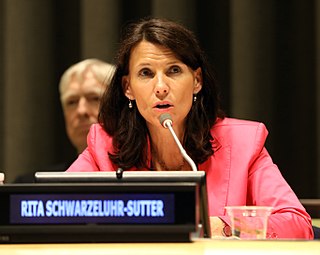
Rita Schwarzelühr-Sutter is a German politician of the Social Democratic Party (SPD) who serves as a member of the German Bundestag and was Parliamentary State Secretary in Chancellor Angela Merkel's third and fourth cabinet. Since December 2021, Schwarzelühr-Sutter is Parliamentary State Secretary in Chancellor Olaf Scholz's first cabinet. She is an outspoken advocate and expert for sustainable development and nuclear safety, recognized both nationally and internationally.

The History of Freiburg im Breisgau can be traced back 900 years. Around 100 years after Freiburg was founded in 1120 by the Zähringer, until their family died out. The unloved Counts of Freiburg followed as the town lords, who then sold it onto the Habsburgers. At the start of the 19th century, the (catholic) Austrian ownership of the town ended, when Napoleon, after having invaded the town, decreed the town and Breisgau to be a part of the Grand Duchy of Baden in 1806. Until 1918, Freiburg belonged to the Grand Duchy, until 1933 to the Weimar Republic and Gau Baden in Nazi Germany. After the Second World War, the town was the state capital of (South) Baden from 1949 until 1952. Today, Freiburg is the fourth-largest city in Baden-Württemberg.
De Aar Solar Power is located 6 km outside the town of De Aar in the Northern Cape Province of South Africa. The facility is based on over 100 hectares of Emathanjeni Municipal land, and comprises 167,580 solar (PV) panels. De Aar Solar Power supplies Eskom with 85,458 MWh of renewable electrical energy per year; enough to power more than 19 000 average South African households.

Messe Freiburg is an event area and exhibition grounds in Freiburg im Breisgau.